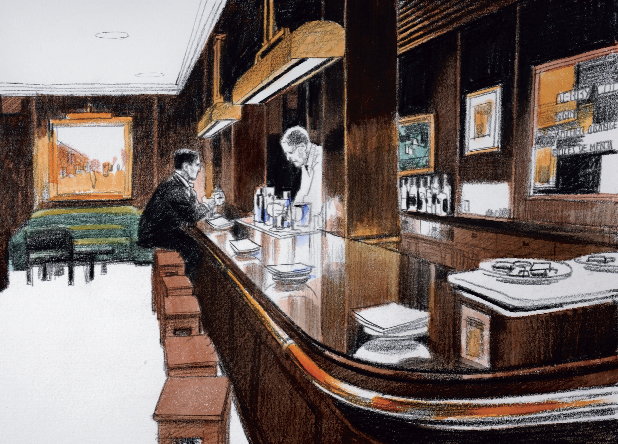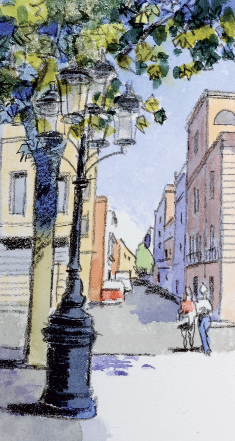Why don’t we leave the real Barcelona to the Russian tourists and build ourselves, the Barcelona people? In the Gràcia neighbourhood, for example, or beyond Sarrià, where there are large areas of unused land.
Although I have dedicated many articles, an entire book and much more to it, Barcelona has changed so much that it would no longer interest me and would even be insufferable if it weren’t for the memories, and the Derby cocktail bar. The memories help me to see the city as it was when I formed my earliest impressions of it. Baudelaire in “The Swan” was the first to point out that it is characteristic of the modern age that city dwellers outlive cities. They are transformed and become unrecognisable before we do: “La forme d’une ville / change plus vite, hélas! que le coeur d’un mortel”. The Derby cocktail bar, and here I reveal a very precious secret, is on Carrer de Muntaner, it is spacious and discreet, has a lovely wooden bar, is decorated according to the most conventional British taste, with equestrian motifs on the walls, an atmosphere of inoffensive muzak based on anodyne versions of contemporary and classic songs, it is attended by an excellent barman wearing a white smoking jacket, who is also the owner, and whose name escapes me, and best of all: there is usually nobody there.
Not true: one night, a year or two ago, I came across a customer there. He was a fairly young man with a greying beard who sunk his cocktails slowly at one corner of the bar whilst ranting and raving about the political classes, particularly the female representatives, whom he judged most harshly. He found them odious; I’m sure this young man had just suffered a serious reversal of fortune and wanted to console himself with Manhattans and vent his anger against those women. The barman listened and nodded but, watching him out of the corner of my eye, I noticed that he had absolutely no interest in that bitter, chauvinist rant. In fact, he barely knew, whilst drying glasses with a cloth and holding them up to the light, what the ill-humoured customer was talking about. In the end, the bad-tempered client, restored by the strength of the Manhattans, left the bar, walking through the green velvet curtains, back out into the real Barcelona, and the mysterious, welcoming, soothing atmosphere of the Derby was gloriously restored. It is a mystery how that bar, clearly at the edge of market forces, still stays open; a bar that is conducive to inner thoughts and fantasy, to recapitulations and imagination, to the feeling that nothing bad ever really happens because time is suspended, in that tranquil, solitary limbo. As I have said, there is never anyone there, not even me, as I hardly ever go. But I just think about the place. It is enough to know that, whenever I want to escape from life’s little annoyances for a while, all I have to do is go through a little side door and there I’ll find the Derby, tutto in fior.
The other day I spent some time there and, while the barman was preparing me an Old Fashioned, I told him the latest news about the tourist industry, particularly Russian tourism, which has saved Barcelona during this lean period. The Russians come here in their droves, an incessant air bridge from Moscow to Barcelona, and they spend like there’s no tomorrow. The banks and telephone companies supply the firms that pay for the details – anonymously – of their exact movements in the city and the surrounding area.
“Really?” said the barman.
Yes, thanks to the information they get from cash points and mobile phone signals, they have drawn up a precise map of the Russians’ movements in the city; and it shows that they never go further than the Diagonal, except to visit the Tibidabo amusement park. If they go on a day trip outside Barcelona, without fail, it’s to Montserrat. As a result, all the retail chains set up shop this side of Diagonal, and all restaurateurs who are on the ball open their bars or restaurants within the area between the old quarter and Diagonal.
“Good heavens!” says the barman.
My friend Corina, who’s from Iasi, a Romanian city where there are lots of linden trees, loves to stroll down the Rambla de Catalunya, particularly if it’s been raining, because that street, one of the most beautiful in Barcelona, is enhanced by the mysterious shade of the lindens and their fragrance. But I no longer notice that delightful sensation. For me, the spell has been broken. Now all I see are the terraces where the foreigners are sitting and, standing before them, the violinist playing Caminito or La vie en rose.
“Gosh.”
Yeah, look, I say to the barman, Baudelaire was right. I have outlived the city I knew, and that’s why this one, the one we have today, the one out there on the other side of the green curtain, which I suppose is objectively better, cleaner, prettier, more hygienic, well lit, streamlined and fluid, suggests nothing to me, and like a fool, I’m left open-mouthed when I discover a little corner, some untouched piece of that other Barcelona from a time when I was also other: the dim light of the porters’ desks at night, the houses down the Permanyer alleyway, the open garages that hug the street that appear to be the dorms of machine operators and their blue-overalled manager, Carrer de Wellington with the zoo wall, the smell of the wild animals, the roar of the lions and trumpet of the elephants, the dilapidated farm houses in Horta.
“Yes, of course,” says the barman. “You’re right.”
I don’t understand why they don’t rebuild that Barcelona from back then, I say. Did you know that the Barri Gòtic is a recent invention, it’s not gothic? Did you know that, in order to preserve the prehistoric paintings in the caves of Altamira, they have built a replica beside them that is so perfect, you can’t tell if you’re in the real cave or the imitation? Did you know that Lyon city centre is being recreated in some country in the Persian Gulf? Did you know that a couple of years ago a team of Chinese surveyors came to Cadaqués to take exact measurements of the town in order to build a perfect replica of the little Costa Brava fishing town on the coast of that huge Asian country? Nowadays, they’re making exact replicas of everything. They’ve even just created an artificial yeast chromosome from chemical elements. Soon we’ll also be able to make animals and human beings in a laboratory.
“I’ve heard about that, yes.”
So why don’t we leave the real Barcelona to the Russian tourists and build a fake one for ourselves, the people of Barcelona? For example, in the Gràcia neighbourhood – which of course would have to be thoroughly demolished first, leaving not a single stone – or out beyond Sarrià, where there are large areas of unused land.
“That’s an idea.”
Then they could give us back those long, autumnal streets covered in dead leaves that were projected in infinite perspectives between the sombre and metaphysical passageways of the buildings, grey from soot. They could give us back the people who have left over the years, and at the end of the street, you’d see their unmistakable silhouettes approaching, step by step. What do I owe you?
“Nothing. What you’ve said is so spot on, it’s on the house.”




